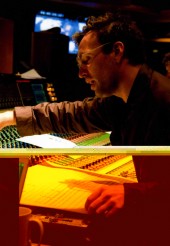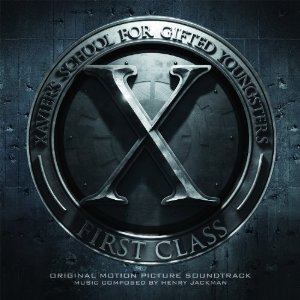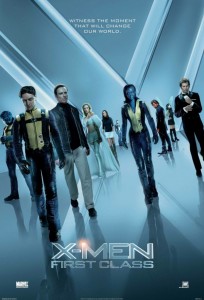As cool as it is to have your music pumping the extra kick-ass mile into the hugely enjoyable antics of non-powered, wannabe superheroes, there’s nothing quite like getting your musical mutant on by graduating to the big leagues of X-MEN: FIRST CLASS, a score that marks a huge evolution for composer Henry Jackman. Starting his career as an innovator in England’s electronica world, Jackman’s equally impressive string arrangements for album producer Trevor Horn drew the attention of Hans Zimmer, a composer with the Magneto-like powers of irresistibly pulling in promising talent to his lair at Remote Control.
It wasn’t long before Jackman evolved from programming and composing additional cues on the likes of THE DA VINCI CODE and THE DARK KNIGHT to stepping out on his own with the rambunctious scores to MONSTERS vs. ALIENS and GULLIVER’S TRAVELS.
Jackman’s own ability to play action and the absurd got the attention of director Matthew Vaughan, who brought in the composer, along with John Murphy, to compose the one two-punch of humor and adrenalin that made KICK-ASS into an acclaimed cult movie. Now it’s time for Jackman and Vaughan to graduate to the big spandex leagues of Marvel’s most famous superhero team. They’ve both earned advanced degrees on how to score a superhero film with blazing heroic energy, with a full assortment of striking orchestral themes, simmering guitar energy and thrilling percussion that’s all about the X-Men’s first evolution in the Marvel universe, let alone the cinematic one- even if these icons don’t realize their self-worth at first. It’s an uneasiness that’s translated into Jackman’s first truly super-powered score after KICK-ASS’ hapless teen vigilante.
“I started with a committed SUPERMAN-style theme in that film, which highlighted the comedic rub of a guy who describes himself as looking like he’d dressed up in a condom,” Jackman remarks. “What’s ironic in X-MEN: FIRST CLASS is that they do have superpowers, but because it’s a prequel, they’re not a team. They’re disjointed, and don’t know what to do with their powers. Some of them don’t event want to have them. While I at first thought to have the score start off with truly heroic music, Matthew and I decided it was better to save that moment for later on in the score. To do that, I stretched out their main theme in half time, which gave the score a sense of striving towards that big SUPERMAN moment. The music is a destination for the characters to find their powers. It’s pregnant with superhero potential, yet isn’t too sure of itself.”
This kind of thematically developing energy would be just as important to Jackman’s score as any ability to fly, bend metal or shape-shift.
“Matthew said he doesn’t really like ‘film music,’ which means he doesn’t want the music to be obvious without committed themes,” Jackman recounts. “So instead of shying away from themes, we got them out in the boldest way possible. We even wrote down every theme we needed on a piece of paper. It was like getting four outfits. And once we had those, all of the music would mean something.”
Particularly striking is Jackman’s John Barry energy for the spot-on 007 eye candy of FIRST CLASS’ early 1960s’ setting. Yet, the music would be about visual opulence, as opposed to stylistic slavishness.
“While Matthew saw Magneto as an early James Bond, we wanted to update that Barry-esque feeling for our 21st-century,” Jackman says. “The music needed to be more important than any time period, because the film’s issues are universal, whether they’re about the need for revenge, or the desire to accept one’s self.”
This summer also sees Henry Jackman apply his melodic skills to the equally iconic characters of WINNIE THE POOH, a score for which he has done a spot-on recreation of the music that generations have come to know and love.
“Winnie the Pooh is quite possibly the most famous children’s character ever devised, but ultimately, the reason why his stories have so much appeal beyond kids is because they create a mythical world of innocent friendship,” says Jackman. “So the path for my music in the Hundred Acre Wood was laid out, to engender a feeling of innocence without being cloying about it. It’s an interesting combination of highbrow classical music mixed in with a bit of Hollywood show tunes. But then, how many times are people going to ask you to do score like this? So I embraced POOH’s musical language. Let’s just say there are far more woodwinds in WINNIE THE POOH then there are in X-MEN!”
Click on link: to purchase: X-MEN: FIRST CLASS score
Click on link: to purchase: WINNIE THE POOH score
Click on link: for AX’s X-MEN: FIRST CLASS movie review
Click on link: for AX’s Professor X of X-MEN FIRST CLASS – Things You Need to Know
Click on link: for AX’s Magneto of X-MEN FIRST CLASS – Things You Need to Know
Click on link: for AX’s Mystique of X-MEN FIRST CLASS – Things You Need to Know
Click on link: for AX’s Beast of X-MEN FIRST CLASS – Things You Need to Know
Click on link: for AX’s Havok of X-MEN FIRST CLASS – Things You Need to Know
Click on link: for AX’s Banshee of X-MEN FIRST CLASS – Things You Need to Know
Click on link: for AX’s Angel Salvadore of X-MEN FIRST CLASS – Things You Need to Know
Click on link: for AX’s Sebastian Shaw of X-MEN FIRST CLASS – Things You Need to Know
Click on link: for AX’s Emma Frost of X-MEN FIRST CLASS – Things You Need to Know
Click on link: for AX’s Azazel of X-MEN FIRST CLASS – Things You Need to Know
Click on link: for AX’s Darwin of X-MEN FIRST CLASS – Things You Need to Know
Click on link: for AX’s Moira MacTaggert of X-MEN FIRST CLASS – Things You Need to Know
Click on link: for AX’s Riptide of X-MEN FIRST CLASS – Things You Need to Know
Follow us on Twitter at ASSIGNMENT X
Fan us on Facebook at ASSIGNMENT X
Related Posts:













